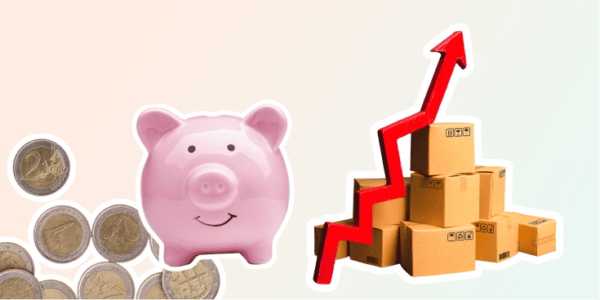
Coronavirus impact on ecommerce sales and buyer behavior
This article is about COVID-19’s impact on ecommerce buyers, sales in specific categories and how online sellers can respond to changes in these unpredictable times.
Ecommerce is affected by the spread of coronavirus. The fear of the unknown is lingering. There’s good news, too: consumers are still shopping online. Some product categories are even thriving.
However, with things constantly changing, sellers need to respond quickly: go with the flow & current ecommerce trends, embrace innovation and act with purpose. The time to address the uncertain future is now.
In this article you’ll learn about:
- How coronavirus has affected sales in selected ecommerce categories
- How to refocus so you can make the best of the current situation
- Important action points to help you weather the storm, including ways of creating meaningful connections with your buyers and building long-term customer loyalty.
Ecommerce in the coronavirus reality
What awaits ecommerce in the novel coronavirus reality are new challenges, but also new opportunities.
On the one hand, due to higher economic uncertainty, some consumers are hesitant to spend. On the other hand, despite the general volatility of the current environment, online performance is holding strong for many sellers.
Since the coronavirus outbreak, traffic has been down for many brands. However, conversions tend to show strong return on investment.
Conversion rates may fluctuate in the near future, but overall online retail has many advantages at a time of crisis. This doesn’t mean that ecommerce sellers can lean back and money will keep flowing in. In fact, flexibility, creativity and innovation in line with ecommerce trends are more essential than ever.
Extra investment may be needed, too. For instance, advertising spend doesn’t seem to be down. Instead of pausing efforts, many retailers are updating ads to reflect the current situation. CPMs, CPCs and corresponding digital cost metrics remain consistent.
FREE download: smart advertising strategies for Amazon sellers
Coronavirus impact on ecommerce buyers & purchases
Criteo has been analyzing data to understand how retail is affected by the coronavirus spread. The data includes insights drawn from over 80 countries and two billion active monthly shoppers (spending ca. USD 900 billion annually across approximately 20,000 ecommerce sites).
Coronavirus impact on retail based on Criteo’s data:
- Some industries will be affected more than others
- Some companies and product categories are actually growing
- Consumers are shifting their spending habits
- Circumstances continue to evolve each day.
Sales of many products are up, e.g. groceries, face masks, household cleaning supplies. Popular are items made for tough times that have a long shelf life, are versatile, and are frequently offered in large formats.
Home furnishing sales stay high, too. With closed offices and employees working from home, items that let people work comfortably and efficiently are in demand. This includes things like office furniture, lamps, rugs, etc.
Overall, the coronavirus situation has an impact on purchasing behavior. In numerous contexts people are more keen on shopping online than before. During this pandemic many consumers are unable to leave their homes or unwilling to do so. Buying from the comfort of one’s sofa seems to be a safer option than going out to the high street. This is how ecommerce benefits both consumers and sellers.
Further, a rise in omnichannel technologies can be expected, e.g. click-and-collect as a result of people wanting to avoid queues and crowds.The digital side of the retail business will grow at a faster pace.
The chart below illustrates the impact of coronavirus on online sales in Italy, one of the countries most severely affected by coronavirus, between February and March 2020.
Coronavirus impact on ecommerce sales in the fashion category
Now, let’s go beyond products typically associated with the coronavirus sales growth (groceries, hygiene-related, etc.). One such category is fashion.
According to Criteo, online transactions in the Fashion & Luxury category (designer clothes, watches, jewelry, handbags) have largely stayed above their 2019 numbers.
Virus or not, the growth trend seems to be continuing. As a result, now may be the best time for ecommerce fashion sellers to use, if they haven’t already, social shopping: one of the top 2020 ecommerce trends.
For example, Cosmo Lady, the largest underwear company in China, has shifted its focus to selling on WeChat.
Social commerce provides opportunities to sell, but also to keep your customers engaged. After all, these days they have more time to do so while self-isolating!
Examples of social commerce include marketing via Facebook Messenger, shoppable feeds and Instagram pages. There are also features in social networking apps that allow marketplaces to sell goods directly in the app without the user leaving it, making it transactional. For instance, Facebook’s built-in shopping feature or Instagram’s internal checkout feature.


Coronavirus changes the role of communication
With the sudden coronavirus outbreak, many 2020 business strategies became outdated at the very start of 2020. Some aspects have become more important as a result of the current social and economic climate.
One of them is communication. These days people, constantly bombarded with pessimistic updates, have lots of questions and concerns. As a consequence, customer support teams must be well prepared to handle customer concerns effectively, especially if the client base is international.
Further, in the face of the global crisis affecting virtually everyone, brands are shifting messaging to promote first and foremost unity and social responsibility, instead of sales. For example, Ford announced payment relief and launched a new campaign promoting unity during daunting times.
You may not have the same resources as big brands, but you can still stay caring and supportive of your customers. This can work wonders when it comes to improving customer loyalty.
Communication is more important than ever. What many people need today are (realistically) positive, uplifting, human-first messages.
Try to stay one step ahead by knowing how to respond but also by offering soothing messages. Give your customer the feeling that you do your best to have things under control. If it’s appropriate, communicating your vulnerabilities can strengthen the connection with your customers, too.
Building connections & staying ethical is what can save many businesses in the long run
After the coronavirus outbreak, some unscrupulous sellers started exploiting ecommerce buyers by listing in-demand products at inflated prices (e.g. masks, hand sanitizers). Profiteering from human desperation for certain products may bring instant profits, but long-term it can destroy the seller’s business.
First, marketplace sellers, for example on eBay, can expect their account to be suspended and to see potential profit losses in the long run. Second, according to Marketing Metrics, the probability of selling to existing customers (60-70%) is much higher compared to new ones (5-20%), so customer loyalty pays off.
Unfortunately, sellers who exploit distressed buyers can probably forget about customer loyalty when the panic is over. It can be hard to turn people who you have ripped off into repeat buyers when things go back to normal.
Instead, now is a good time to improve relationships with your customers. You can build future competitive advantage NOW.
Staying proactive & delivering a brand with purpose
There are many ways to build meaningful connections with your buyers. Many companies have started to help fight COVID-19. This way they can serve the world and enhance their good PR as a by-product.
For example, LVMH, the parent company of luxury brands including Louis Vuitton or Dior, announced they will be producing goods, such as sanitizing gels, to help hospitals. Japanese consumer electronics manufacturer Sharp announced that they’re now making surgical masks, utilizing a factory in central Japan that usually makes TV screens.
Every little helps. Again, you may not have the same resources as big brands, but you can still support relevant healthcare authorities and agencies through donations, information and education. You can also consider repurposing production lines or adjusting your product portfolio to help address shortages of high-demand essential products.
By your actions you can show your commitment to delivering a “brand with purpose” and making a meaningful difference. Additionally, this strengthens connections between brands, consumers and the wider community.
With hindsight, people remember how companies behave, particularly in times of distress.
When delivering a brand with purpose, it’s crucial to:
- Be driven by cause, not profits (forego short-term financial gain)
- Be ethical, authentic, genuine & impactful
- Be collaborative: help develop collaborative new business ecosystems that bring together consumers, special interest groups and other companies to help solve society’s common problems.
Stay creative, stay proactive and stay healthy!

Download our FREE ecommerce calendar to help you plan your sales strategy for the rest of 2020.
Sources
- 5 Ways the Coronavirus is Affecting Consumer Behavior
- What eCommerce Managers and Directors should know in the time of Coronavirus
- How Consumer Product Brands Are Achieving Purpose by Aiding the Fight Against COVID-19
- COVID-19’s Lasting Impact on Digital Advertising
- Impact of coronavirus on e-commerce in Italy
Related Posts:
Ecommerce Newsletter
By clicking the “Subscribe now” button, you agree to receive our monthly e-mail newsletter and regular marketing and commercial communications by email from Webinterpret regarding marketing trends and our digital marketing services. You confirm that you have read and agreed to Webinterpret’s Terms of Service and Privacy Policy.





